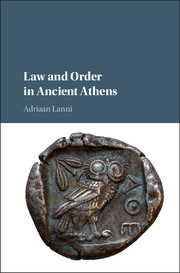 Cambridge University Press has
published Law and Order in Ancient Athens by Adriaan Lanni, Harvard Law School. From the press:
Cambridge University Press has
published Law and Order in Ancient Athens by Adriaan Lanni, Harvard Law School. From the press:The classical Athenian "state" had almost no formal coercive apparatus to ensure order or compliance with law: there was no professional police force or public prosecutor, and nearly every step in the legal process depended on private initiative. And yet Athens was a remarkably peaceful and well-ordered society by both ancient and contemporary standards. Why? Law and Order in Ancient Athens draws on contemporary legal scholarship to explore how order was maintained in Athens. Lanni argues that law and formal legal institutions played a greater role in maintaining order than is generally acknowledged. The legal system did encourage compliance with law, but not through the familiar deterrence mechanism of imposing sanctions for violating statutes. Lanni shows how formal institutions facilitated the operation of informal social control in a society that was too large and diverse to be characterized as a "face-to-face community" or "close-knit group."Some reviews:
“Classical Athens was a marvel. With style and insight, Lanni scours the limited sources to identify the institutions that enabled the city to flourish.” -Robert Ellickson
“The Classical Athenian democracy, despite its relatively weak mechanisms of formal coercion, normally exhibited a remarkably high level of social order. This is a puzzling paradox that Harvard Law School professor Adriaan Lanni, building on her exemplary Law and Justice in the Courts of Classical Athens (Cambridge, 2006), decrypts and illuminates with her usual brilliance of insight and forensic skill in argument.” -Paul Cartledge
“This is a groundbreaking work. Lanni provides a fascinating analysis of the complex interplay of formal and informal norms and procedures, showing how such features as the expressive function of laws can help explain why, despite the unpredictable and inconsistent judicial enforcement of statutory norms, Athenians by and large adhered to both statutory and non-statutory norms.” -Michael Gagarin
“In this masterful, deeply textured, in-the-round account of ancient Athenian law and social practice, Adriaan Lanni explores a deep mystery about ancient democracy: how did the Athenian state, with its limited coercive capacity, achieve a peaceful and productive social order? Lanni elucidates how law’s expressive function dynamically interacted with formal Athenian legal institutions, and with litigants’ strategic deployment of extra-statutory norms. As a result, we understand better than ever before how the Athenians successfully deterred socially destructive behavior, how they survived civil war, and how bold courtroom arguments can change social behavior through creatively reinterpreting the relationship between law and norm. Lanni’s outstanding legal sociology reveals anew the startling similarities and discontinuities between ancient and modern approaches to democracy and rule of law.” -Josiah Ober
Further information is available here.